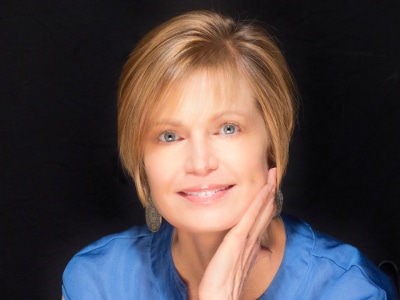Julie Gregory was at risk for Alzheimer’s. Here’s how genetic testing for Alzheimer’s changed her life.
As she turned 50 years old, Julie Gregory began experiencing symptoms of cognitive decline. They weren’t severe and she initially attributed them to middle age or her lifestyle. Then Gregory decided to learn more about her genetic makeup and had her DNA analyzed by a commercial company.
When the results came back, she was staggered. They showed she carried two copies of apolipoprotein E4, or ApoE4, a variation of the gene that is associated with heart disease and an increased risk of cognitive degeneration and Alzheimer’s disease. Carrying the gene does not mean she will definitely develop Alzheimer’s, but studies suggest that 91 percent of those with two copies of it do, on average at age 68.
“It was pretty scary news,” Gregory, now 55, said. “I’ve since learned that there’s a lot of dementia in my family.”
Less than two percent of the population carries two copies of the ApoE4 gene. Doing so requires both parents to pass down a copy of the gene. Meanwhile, about one in four people inherit one copy of the gene, which doubles or triples their risk of developing Alzheimer’s disease.
Rather than run away from the finding, Gregory, a marriage and family therapist in the Chicago area, sought a new challenge. She founded an online forum called ApoE4 Info that serves as a clearinghouse for discussion of new research into genetic aspects of Alzheimer’s and supports people who are grappling with the ramifications of learning their ApoE4 status.
Today the forum has more than 800 members, many of whom have already undergone testing to learn whether they carry the gene. Gregory is the group’s president, one of 11 volunteer officers. Some members haven’t been tested and are still considering whether knowing their status would help them to modify their risk or cause them unnecessary depression and anxiety about a fate they cannot control, Gregory said.
“We have some members who say they want to know everything,” she said. “And we have some members who went straight to their psychiatrist’s office with post-traumatic stress disorder after hearing the news. Alzheimer’s is progressive, incurable, untreatable and fatal.”
Alzheimer’s afflicts more than five million people in the U.S., according to the Alzheimer’s Association, and more than 46 million worldwide at an annual cost of more than $800 billion, according to Alzheimer’s Disease International. It destroys a person’s memory and their capacity to think and reason. Its onset is gradual and mild symptoms can occur a decade or more before it is diagnosed. The number of people suffering from it is expected to nearly triple by 2050, as life expectancies rise further in lower-middle- and low-income countries.
Gregory said she found that information available to people who learn that their genetic status predisposes them to Alzheimer’s could be confusing or inaccessible.
“There’s still so much we don’t know,” Gregory said. “There’s lots of debate and controversy and mixed messages.”
Many published studies aren’t definitive because scientific evidence is often amassed incrementally, study conclusions may contradict previously accepted knowledge and some laypeople and professionals don’t know how to interpret the significance of risk estimates. This lack of consensus extends to frontline doctors, Gregory added.
“The experience the vast majority of our members have is they go to their physicians and say, ‘I carry two copies of this gene, what should I do?’ and they [the doctors] say ‘What gene?”’ Gregory said.
She founded Apoe4 Info to help people learn as much as possible about the genetic variant. The non-profit group works with researchers around the world, discusses and debates newly published papers with them online and takes part in tests of biomarkers, biological characteristics that may explain why some people develop Alzheimer’s while others do not.
Since Alzheimer’s has no cure and medications approved for the market are only effective at managing symptoms in the disease’s early stages, Gregory said that many of the forum’s members are very eager to learn about what may prevent or delay its development. Since the ApoE4 gene also heralds heightened susceptibility to high cholesterol, a factor in some types of heart disease, keeping track of their blood chemistry is often a starting point.
Monitoring blood sugar levels, markers of inflammation, vitamin levels, body-mass index and blood pressure – and keeping these within healthy ranges – may protect against development of Alzheimer’s if early research findings are ultimately replicated and proven valid in the coming years, Gregory said. Other studies suggest that improving sleep patterns, stress levels, exercise or social engagement may also protect some people against the disease. But more research is needed to establish those claims.
One day genetic tests may become routine, and be conducted on children, newborns or in the womb for a variety of conditions. Gregory says she believes that no one is ever too young to become aware of their ApoE4 status and that parents might want to know if their young children carry the gene — in the hope that they may be able to reduce their risk.
Gregory doesn’t know what the future holds for her, but she doesn’t regret learning that she has two copies of ApoE4 and, consequently, a higher risk of Alzheimer’s disease.
“It was a huge tipping point in my life,” she says. “Now I know I have to be healthy.”


Was diagnosed with Alzheimer’s Disease a year ago. My family has a history of the disease.
I have two aunts that have the same disease.So must be heriditary.
If a third of Dementia Cases could be prevented Please Please tell us how
Vera Wiebe,
See Dr. Dale Bredesen’s recent book, titled _The End of Alzheimer’s: The First Program to Prevent and Reverse Cognitive Decline.
My husband has two copies of this gene. He was diagnosed at age 72 by lumbar puncture and has been in studies of experimental drugs since then. At age 79 the slow decline of this disease has not been halted. He had high cholesterol which has been controlled for years. He has no other health issues and leads an active lifestyle. It is very discouraging and guilt producing to read of how Alzheimer’s can be prevented, when deep down I know that his could not have been.
My husband was given the news 14 years ago he had ALZ. Found out he has two of the APOE genes. He is the youngest of 15 children. 4 out of the 15 have Alz. I justwore out physically and mentally and had to place Jim in a memory care two months ago.It is awful ,horrible to watch a love one go though this! His body is there but he is not most days.
The Generation Study elected to disclose the following “lifetime” risks of MCI or dementia to its potential participants: 30%–55% for individuals with APOE-e4/e4; 20%–25% for individuals with APOE-e3/e4 and -e2/e4 (with a note that risk might be lower for those with APOE-e2/e4); and 10%–15% for individuals with APOE-e3/e3, -e3/e2, and -e2/e2 (with a note that risk might be lower for those with APOE-e2/e3 and -e2/e2).
The risk quoted for people with ApoE 4/4 is 30-55%–a huge range. That’s because a lot of other genetic and lifestyle factors are at play. I like to think of it this way: For people a generation older than you two, somewhere between 45% and 70% will not have even mild cognitive impairment by the age of 85.
PLEASE STOP SAYING APOE4/4 have a 91% chance of getting this disease. You’re information is flawed and you need to revise it.
Amy, thank you for this: “PLEASE STOP SAYING APOE4/4 have a 91% chance of getting this disease. You’re information is flawed and you need to revise it.”
I have two copies of APoE 4, found out from 23andMe. I am 52, no known history of Alzheimer’s, although it could be because other things killed my ancestors before they developed it. My mother died after a stroke at age 70. Her mother died from cancer in her early 60s, and her grandmother did as well. My father died from heart and lung disease at 72. His father died of cancer at 89.
I don’t recall hearing of any relatives with dementia or Alzheimer’s. Still, this finding on 23andMe has me spinning and questioning every little thing I forget. It does feel like a ticking time bomb, and it’s really scary.